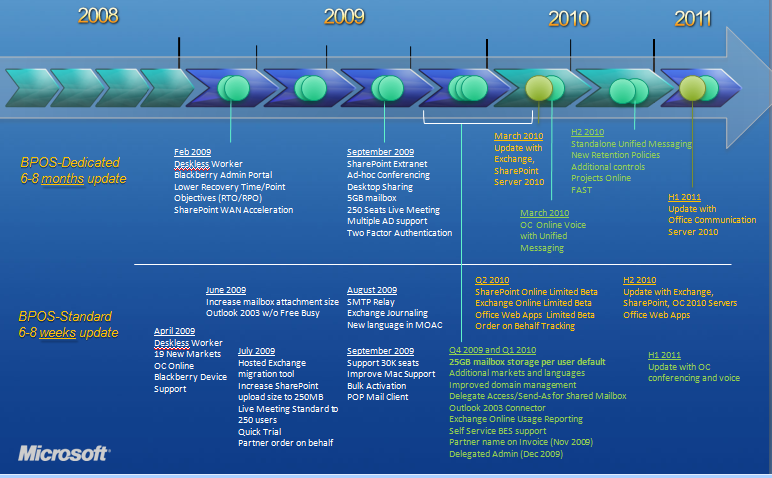What's next for Microsoft's cloud-hosted business suite?

Microsoft has some big changes coming this year for its Business Productivity Online Suite (BPOS), the Microsoft-cloud-hosted bundle of Exchange Online, SharePoint Online, Office Communications Online and Office Live Meeting.
A source of mine who was briefed on what's in the pipeline shared some of the details with me, noting that the information he received was current as of November 2009 (meaning the exact dates and deliverables may vary somewhat by the time the company delivers on them later this year and early next).
Here's a slide he shared with me that provides an overview of Microsoft's BPOS roadmap (again, as of last November):

Before delving into the particulars, it's important to understand the distinctions between the two primary SKUs of BPOS. (There's a third, recently introduced Federal BPOS SKU, but that's not part of this discussion.) THe "Standard" BPOS offering is a multi-tenant (multiple customers sharing the same hardware platform). The "Dedicated" BPOS offering, targeted at larger customers -- typically those with more than 20,000 seats -- is built on a set of hardware dedicated for a single customer. Standard BPOS is updated with new features every six to eight weeks. Dedicated BPOS is updated every six to eight months.
The biggest change coming for both Standard and Dedicated BPOS customers is a refresh of services that are part of the "Wave 14" release of products. In other words, Microsoft will be making available to BPOS cloud customers a number of the features that it is rolling out first in its on-premises products, like Exchange Server 2010 (which released to manufacturing at the end of last year), SharePoint Server 2010 (which is due to RTM in April); and Office Communications Server 2007 R2 (which RTM'd late last year) and Office Communications Server 2010, which is expected to RTM at the end of calendar 2010.
The Microsoft-hosted Exchange and SharePoint services will be updated first -- in beta form in the next month or so for BPOS Standard users, and then in final form in the second half of this year. Communications Online users will get only the OC Voice technology from the on-premises OCS 2010 product in this calendar year. The rest of the OCS 2010 features will find their way into the cloud-hosted version of Communications Server in the first half of 2011, according to my source.
What else is coming for Microsoft's growing cadre of cloud customers in calendar 2010? There's a "Lite" version of BPOS coming, that will be targeted at SMB customers with 25 seats or less, as I've reported previously. (I am hearing BPOS Lite is a second half 2010 deliverable.) My source says there's another new SKU, known as BPOS E (Enterprise) coming, as well, that will include Enterprise Client Access License (CAL) features. I don't know any feature specifics about either of these products.
Additionally, Microsoft is telling customers and partners that it is trying to establish a new platform that its BPOS services will run on. I don't think they're talking about the rehosting of BPOS on Windows Azure here, which company officials have said is a long-term goal for Microsoft's Online/managed services unit. Instead, this is more of a developer platform: Something that will provide developers and customers with a more programmable layer, allowing them to interact directly with Microsoft's hosted services via a set of application programming interfaces that bypass the BPOS user interface.
I've heard Microsoft will likely highlight at its Office 2010 launch in New York on May 12 some of the enterprise "three screens and a cloud" scenario that BPOS and the individual, Microsoft-hosted services that comprise that product, will enable. I've also heard that Microsoft is pitching BPOS hard to its customers and its partners in its current and next fiscal years.
Anyone out there gotten the BPOS pitch? What do you think Microsoft is doing right and wrong with BPOS, vis-a-vis its business productivity competitors like Google with Google Apps?